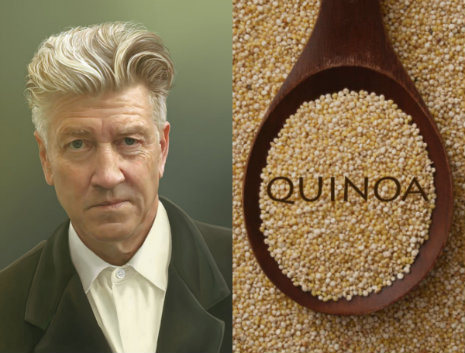- The Silk Road Gourmet talks about Reconstructing Cuisines And Recipes From The Ancient World.
- Colin Tudge splutters about The Founding Fables of Industrialised Agriculture.
- India’s ongoing onion crisis still a vale of tears.
- But India’s jowar (sorghum) still offers superficial health benefits.
- You know how all the US soybeans are being exported to China? Think again.
- How the nasturtium got its spur; not a just-so-story.
- California discovers the productive miracle of fish in rice paddies.
David Lynch cooks quinoa

I borrowed the image from the same place that brought this — David Lynch cooks quinoa — to the world’s attention. No really. But where’s the high-quality version? And the missing minutes? C’mon. And in Part II, what sounds like Inca Cola, but isn’t. In the dark!
Seriously, this has to be seen.
Nibbles: Apples, Peanuts, Seeds
- It was Apple Day in the UK yesterday; here’s a decent account.
- The origin of the peanut; an account you may be able to understand.
- An amazing online seed finder: only in America.
Nibbles: Oca, Tasmanian Potatoes, Pasture diversity, Training for NUS, Kales
- There are still people who think oca is a kind of potato. After all we’ve done for them.
- And speaking of New Zealand Yams, here’s an old article about Tasmanian boutique potatoes.
- Pasture diversity for animal welfare and profit
- Young scientist in sub-Saharan Africa? Get trained on aspects of neglected and underutilized species.
- So you thought kale was an ancient veggie? Think again. NYT features kale innovators.
Stop vitamin A supplements
The editorial by Thorne-Lyman and Fawzi in 2011, (1) referring to the meta-analysis of the impact of vitamin A supplements by Mayo-Wilson, Imdad and others, (2,3) has now become more important than ever. The DEVTA results, only informally available in 2011, have now been published, (4) with extensive implications; indeed, as the editorial (1) says: ‘… the null findings have left lingering questions. Is vitamin A supplementation effective?’. These results have been the subject of conflicting comments recently in the Lancet, e.g. (5,6). But a number of inferences that should be drawn from the compilation and analysis of the evidence from trials prior to DEVTA (2,3) help answer this lingering question, and have not received adequate attention. There are three key related points, which now point to the need to seriously consider concrete steps to move beyond 6-monthly vitamin A supplementation at unphysiological levels.
OK, there’s a lot in that introduction to a recent paper in the British Medical Journal to digest, but it is worth it. I know I bang on about the colossal boondoggle that is high-dose vitamin A supplementation, but there’s a reason. It seems to be a complete waste of money based on a very limited reading of the evidence. In 2011 the BMJ published an editorial on Improving child survival through vitamin A supplementation (which is behind a paywall) that referenced a meta-analysis of supplementation. The new paper — Is vitamin A supplementation effective? — brings things up to date with a more detailed analysis of some of the research only hinted at in the original articles. Bottom line: there is no evidence for large-scale effectiveness of vitamin A supplements on child mortality.
As the authors of the rebuttal ask, why are resources still going into supplementation campaigns of the old sort? And they conclude:
Improved diets, fortified foods, and multiple micronutrient provision would surely bring broader improvements in nutrition to more people, including reproductive aged women who are now largely excluded.